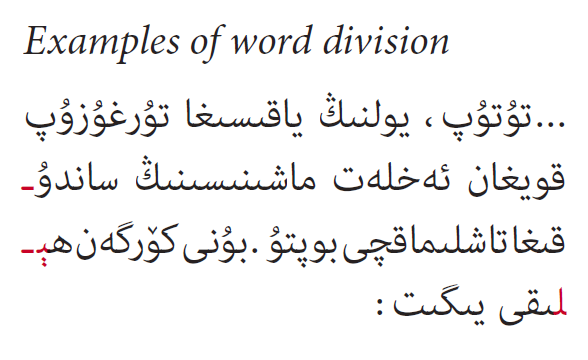- From: John Hudson <tiro@tiro.com>
- Date: Tue, 27 May 2014 16:08:38 -0700
- To: Richard Ishida <ishida@w3.org>, Jonathan Kew <jfkthame@gmail.com>, www International <www-international@w3.org>, W3C Style <www-style@w3.org>
- Message-ID: <53851AF6.7080501@tiro.com>
On 27/05/14 2:12 PM, Richard Ishida wrote: > Then perhaps we should replace the Arabic example with one in Uighur. I wrote a paper on Uighur text handling for Adobe a few years ago. Here's the section on line breaking: Reinhard F. Hahn (_Spoken Uyghur_ 1991) describes the traditional convention for splitting words at linebreaks: "No particular symbol is used to indicate end-of-line divisions in the kona yeziq. Where applicable, the last letter before a division appears in its initial or medial form, and the first letter after a division appears in its medial or final form. In other words, they appear as though they were still connected, despite being on two different lines." Recent books we consulted that employ word division in line breaking -- e.g. Davamĕt 1993, Samsaḳ 1985 -- follow this convention but with the addition of an explicit hyphen which is similar in form to a straight kashida (U+0640 ARABIC TATWEEL). This mark is inserted after both left-connecting and non-connecting letters at line-end. It is not known how this convention should be handled from an encoding and line layout perspective, so no recommendation is made for font implementation at this time. The attached image illustrates the convention described in the last paragraph. The books referenced are: Davamĕt, Tömür. _Söyümlük yurtum Şincañ._ Urumçi. Şincañ H̱ĕlḳ Nĕşriyati, 1993. Hahn, Reinhard F. _Spoken Uyghur._ Seattle. University of Washington Press, 1991 Samsaḳ, Turdi. _Aẖirĕttin kĕlgĕnlĕr : roman._ Urumçi. Şincañ Yaşlar Nĕşriyati, 1985. JH
Attachments
- image/png attachment: Uighur_word_division.png

Received on Tuesday, 27 May 2014 23:09:19 UTC